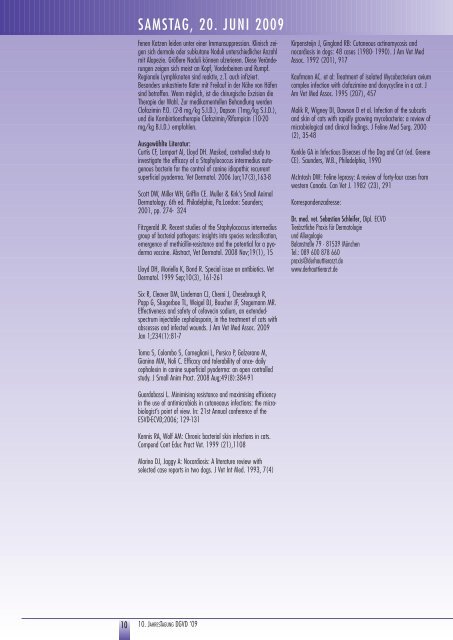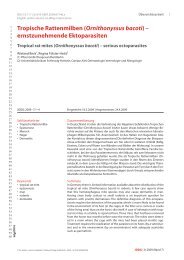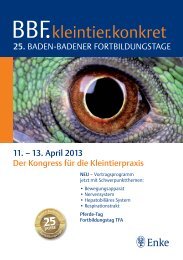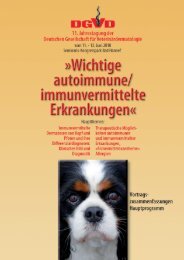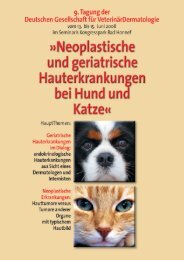INFEKTIONEN DER HAUT - Deutsche Gesellschaft für ...
INFEKTIONEN DER HAUT - Deutsche Gesellschaft für ...
INFEKTIONEN DER HAUT - Deutsche Gesellschaft für ...
Sie wollen auch ein ePaper? Erhöhen Sie die Reichweite Ihrer Titel.
YUMPU macht aus Druck-PDFs automatisch weboptimierte ePaper, die Google liebt.
10<br />
SAMSTAG, 20. JUNI 2009<br />
fenen Katzen leiden unter einer Immunsuppression. Klinisch zeigen<br />
sich dermale oder subkutane Noduli unterschiedlicher Anzahl<br />
mit Alopezie. Größere Noduli können ulzerieren. Diese Veränderungen<br />
zeigen sich meist an Kopf, Vorderbeinen und Rumpf.<br />
Regionale Lymphknoten sind reaktiv, z.T. auch infiziert.<br />
Besonders unkastrierte Kater mit Freilauf in der Nähe von Häfen<br />
sind betroffen. Wenn möglich, ist die chirurgische Exzision die<br />
Therapie der Wahl. Zur medikamentellen Behandlung werden<br />
Clofazimin P.O. (2-8 mg/kg S.I.D.), Dapson (1mg/kg S.I.D.),<br />
und die Kombintionstherapie Clofazimin/Rifampicin (10-20<br />
mg/kg B.I.D.) empfohlen.<br />
Ausgewählte Literatur:<br />
Curtis CF, Lamport AI, Lloyd DH. Masked, controlled study to<br />
investigate the efficacy of a Staphylococcus intermedius autogenous<br />
bacterin for the control of canine idiopathic recurrent<br />
superficial pyoderma. Vet Dermatol. 2006 Jun;17(3),163-8<br />
Scott DW, Miller WH, Griffin CE. Muller & Kirk’s Small Animal<br />
Dermatology. 6th ed. Philadelphia, Pa.London: Saunders;<br />
2001, pp. 274- 324<br />
Fitzgerald JR. Recent studies of the Staphylococcus intermedius<br />
group of bacterial pathogens: insights into species reclassification,<br />
emergence of methicillin-resistance and the potential for a pyoderma<br />
vaccine. Abstract, Vet Dermatol. 2008 Nov;19(1), 15<br />
Lloyd DH, Moriello K, Bond R. Special issue on antibiotics. Vet<br />
Dermatol. 1999 Sep;10(3), 161-261<br />
Six R, Cleaver DM, Lindeman CJ, Cherni J, Chesebrough R,<br />
Papp G, Skogerboe TL, Weigel DJ, Boucher JF, Stegemann MR.<br />
Effectiveness and safety of cefovecin sodium, an extendedspectrum<br />
injectable cephalosporin, in the treatment of cats with<br />
abscesses and infected wounds. J Am Vet Med Assoc. 2009<br />
Jan 1;234(1):81-7<br />
Toma S, Colombo S, Cornegliani L, Persico P, Galzerano M,<br />
Gianino MM, Noli C. Efficacy and tolerability of once- daily<br />
cephalexin in canine superficial pyoderma: an open controlled<br />
study. J Small Anim Pract. 2008 Aug;49(8):384-91<br />
Guardabassi L. Minimising resistance and maximising efficiency<br />
in the use of antimicrobials in cutaneaous infections: the microbiologist’s<br />
point of view. In: 21st Annual conference of the<br />
ESVD-ECVD;2006; 129-131<br />
Kennis RA, Wolf AM: Chronic bacterial skin infections in cats.<br />
Compend Cont Educ Pract Vet. 1999 (21),1108<br />
Marino DJ, Jaggy A: Nocardiosis: A literature review with<br />
selected case reports in two dogs. J Vet Int Med. 1993, 7(4)<br />
10. JAHRESTAGUNG DGVD ’09<br />
Kirpensteijn J, Gingland RB: Cutaneous actinomycosis and<br />
nocardiosis in dogs: 48 cases (1980- 1990). J Am Vet Med<br />
Assoc. 1992 (201), 917<br />
Kaufmann AC. et al: Treatment of isolated Mycobacterium avium<br />
complex infection with clofazimine and doxycycline in a cat. J<br />
Am Vet Med Assoc. 1995 (207), 457<br />
Malik R, Wigney DI, Dawson D et al. Infection of the subcutis<br />
and skin of cats with rapidly growing mycobacteria: a review of<br />
microbiological and clinical findings. J Feline Med Surg. 2000<br />
(2), 35-48<br />
Kunkle GA in Infectious Diseases of the Dog and Cat (ed. Greene<br />
CE). Saunders, W.B., Philadelphia, 1990<br />
McIntosh DW: Feline leprosy: A review of forty-four cases from<br />
western Canada. Can Vet J. 1982 (23), 291<br />
Korrespondenzadresse:<br />
Dr. med. vet. Sebastian Schleifer, Dipl. ECVD<br />
Tierärztliche Praxis <strong>für</strong> Dermatologie<br />
und Allergologie<br />
Balanstraße 79 · 81539 München<br />
Tel.: 089 600 878 660<br />
praxis@derhauttierarzt.de<br />
www.derhauttierarzt.de


